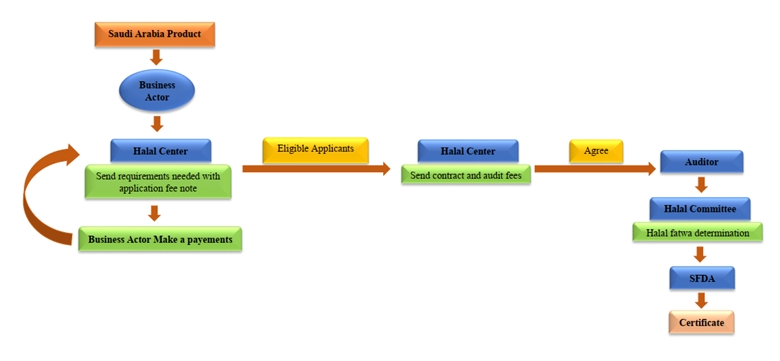A Comparison of Halal Product Standards in Indonesia and the Kingdom of Saudi Arabia
Main Article Content
Abstract
In the era of globalization and increasingly fierce economic competition, halal industry opportunities are an important focus of the government in understanding the dynamics of the global market. The rapid growth of the Muslim market is partly due to the high birth rate of Muslims compared to the birth rate in Western countries. This high growth has the potential to drive an increase in the market as well as the global economy because Muslims generally seek Halal products that are made following Islamic principles. The government continues to strive to develop this industry and make various regulations to regulate the entire process that occurs. Halal standards that apply in each country are, of course, different, and tailored to the conditions and needs of the country. The main purpose of this research is to analyze and compare the practice and regulation of halal products in Indonesia and Saudi Arabia. Based on comparative and qualitative analysis, it can be concluded that halal policies in Indonesia and Saudi Arabia have several significant differences, such as halal policies, procedures and provisions in halal certification, types of halal mandatory products, and slaughter criteria.
Article Details

This work is licensed under a Creative Commons Attribution-NonCommercial 4.0 International License.
Copyright
Authors who publish their manuscripts in this journal agree to the following terms:
- The copyright of each article remains with the authors.
- Halal Research Journal holds the right to publish the article first under the Creative Commons Attribution 4.0 International License.
- Authors may distribute their published manuscripts non-exclusively (e.g., to institutional repositories or as part of book publications), provided they acknowledge that the article was first published in this journal.
License
Articles published in this journal are licensed under the Creative Commons Attribution 4.0 International License. This license permits anyone to:
- Copy, distribute, adapt, modify, and create derivative works from the material in any form, including for commercial purposes.
- The condition is that proper credit must be given to the authors for the original work.
References
References
Hermawan, H. A., et al. 2022. Development of the Halal Industry in Indonesia. Scientist Publishing
Kurnia, Y. 2022. State Policies and the Increasing Number of Atheism in the Middle East: A Case Study of Saudi and Turkey. CMES: Journal Studi Timur Tengah, Volume XV, Number 1.
Yulia, L. 2015. Halal Product Industry Development Strategy. Journal Bimas Islam Vol.8. No. I
Warto, W., & Samsuri, S. 2020. Halal Certification and Its Implications for Halal Product Businesses in Indonesia. Al Maal: Journal of Islamic Economics and Banking, 2(1), 98-112.
Alrobaish, W. S., Vlerick, P., Luning, P. A., & Jacxsens, L. 2021. Food safety governance in Saudi Arabia: Challenges in control of imported food. Journal of Food Science, 86(1), 16-30.
Ministry of Religious Affairs. 2023.Indonesia - Saudi Arabia Sign Cooperation on Halal Product Guarantee. Accessed on 24 October 2023. https://kemenag.go.id/internasional/indonesia-arab-saudi-teken-kerja-sama-jaminan-produk-halal-5xYox
Saudi Food & Drug Autority (SFDA). 2023. List of Recognized Bodies. https://halal.sfda.gov.sa/user/sign-in Accessed on 19 February 2024
https://djpen.kemendag.go.id/app_frontend/contents/147-definisi-manfaat Accessed on 30 October 2023
Halal Product Assurance Administration Agency (BPJPH). 2022.About BPJPH. Accessed on 15 November 2023. https://bpjph.halal.go.id/detail/tentang-bpjph.
Halal Product Guarantee Agency. 2022.About BPJPH. Accessed on 15 November 2023. https://cmsbl.halal.go.id/uploads/Brosur_Sertifikasi_Halal_Reguler_5ffd8aa0bf.pdf
Halal Product Guarantee Agency. 2022.About BPJPH. Accessed on 15 November.2023. https://cmsbl.halal.go.id/uploads/Brosur_PTSP_20_c0a8ee3ce6.pdf
Ministry of Religious Affairs. 2021. Decree of the Minister of Religious Affairs Number 748 of 2021 concerning types of products that must be Halal certified. Accessed on 18 November 2023.https://jdih.kemenag.go.id/regulation/read?id=2756&t=Keputusan+Menteri+Agama+Nomor+748+Tahun+2021+Tenta
Saudi Food & Drug Autority. 2022. Saudi FDA Products Classification Guidance Version 6.1. Arab Saudi
LPPOM MUI. Accessed on 20 November 2023. https://halalmui.org/kriteria-sistem-jaminan-halal-dalam-has23000/
Standards, Metrology and Quality Organization. 2003. SASO 2172. General Requirements for Halal Food. Saudi Arabia
GCC Standardization Organization. GSO 2055-1.2015. Gulf Technical Regulation - HALAL FOOD - Part 1: General Requirements
National Standards Agency. 2018. SNI 99003:2018. Slaughtering of Ruminants. Indonesia
National Standards Agency. 2016. SNI 99002:2016. Halal slaughter of poultry. Indonesia
National Technical Committee for the Food and Agricultural Standards Sector. Emirates Authority for Standardization & Metrology (ESMA). 2022. Animal Slaughtering Requirements According to Islamic Rules. UAE.S /FDS 993:2020. United Arab Emirates
